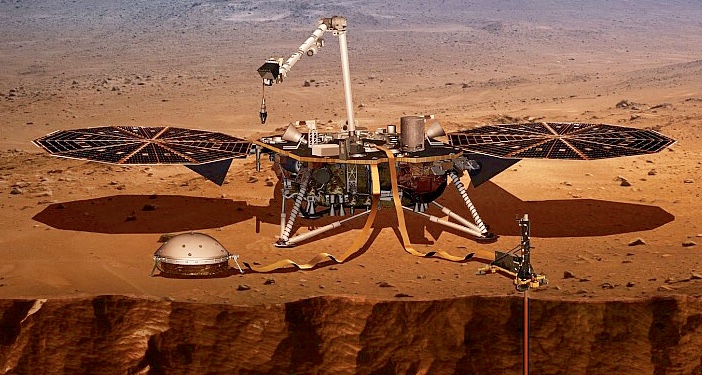Touchdown on Mars: What InSight’s Feat Means for Humanity
By Michael Myllek
At 2:52:59 p.m. ET on Monday, Nov. 27, the NASA vessel InSight touched down on the surface of Mars. This is the eighth time we have landed on Mars; however, this will be the first of its kind in which it is examining the interior of Mars. NASA describes the goal of the mission as to “study the interior of Mars and take the planet’s vital signs, its pulse, and temperature.”
Surely, the results will be highly anticipated and will provide a unique insight into Mars and its composition. Beyond just the surface information and data we will get back, this is not just an incredible event for science, but also humanity at large.
This opens up a whole new window of possibilities into the future, our future. Still, it seems difficult to imagine simply landing on Mars, and not for the first time, will have any large implications. To further unpack this, I want to explore what this landing does mean and what it does not.
This does not mean that we will be settling on Mars anytime soon. Yes, this mission will likely bring back information that will tell us if Mars holds the potential for hosting human life, and yes, this is very exciting. However, it is important to remember the results are not guaranteed to come back at all, let alone to come back positive.
Only 40 percent of the missions to Mars have been successful in the past, mainly because of its abnormally thin atmosphere. Still, these missions are incredibly technical, and we have never tried to get below the surface of Mars before, so there is a chance we will not get the results we want, or even expect. It is also important to remember that having a robot land on a planet is leaps and bounds away from mankind inhabiting a planet.
Humans require a sufficient atmosphere, water and other miscellaneous resources, whereas robots do not. Also, as mentioned earlier, only 40 percent of trips to Mars are successful.
Even if we gather the data that is most conducive to living there, we would still need to perfect the landing process and figure out how to make it possible for mass amounts of people to survive the landing. These are things we have been trying to fix for years now with only minimal progress.
This is not all to say that this landing is not a monumental step in the right direction. Being able to study Mars’ core could also give us further insight into the core of other planets. Since this is the first planet other than Earth that we’ll be able to physically study, it will serve as our only insight into the composition of other planets.
It also means that human beings are not done innovating yet. While this sounds obvious, many who study income inequality blame much of it for slowed innovation. Many technological breakthroughs (better phones, laptops, cars etc.) have merely been improvements on already existing technology.
If enough new data from Mars is collected on this mission, it will provide an encouraging step towards cultivation of new ideas that were never even thought possible.
This mission can also provide something that all humans crave: opportunity. While this expedition isn’t the end-all-be-all in regards to settling on Mars, it is certainly a step. Until we at least know whether or not Mars is inhabitable, there is no chance that we can make that our goal. Just gathering enough information to decide if it is possible or not is essential.
One other component to this that may not be explicit is the environmental ramifications of this. One proposed “solution” to climate change is that eventually we will advance so much technologically that we will be able to simply go to Mars and leave our wreckage on Earth behind like something out of Wall-E.
The results we get back from this mission under no circumstances mean we should pollute as much as we want and undo all the changes we have made to help the environment.
However, since the results will help tell us if we will even be physically able to go to Mars, it will give us a possible insight into if we have to take measures to make this our permanent home or not. If we find out that going to Mars will most likely never happen, it will likely raise the urgency a bit for environmental activists since it will signal that we are likely stuck on Earth for the foreseeable future.
While the InSight mission is a big deal in that it is exploring uncharted territory, we should certainly temper our expectations on its implications, especially in the short term.
However, I do think it provides an element of excitement about the potential for mankind’s future, and will allow us to open up new doors of knowledge and exploration.
Michael Myllek, FCRH ’19, is an economics and political science major from White Plains, New York.










































































































































































































